Family

 My sister-in-law, Rachel Schulenberg was born just three days after my husband and I were married. It seems strange that my sister-in-law was about the age of my own children, but then my husband’s family was spread out in years, and my brother-in-law, Ron was only seven years old when I married his brother. Rachel would have been 50 years old today, had not her life been cut short by a stroke on January 19, 2021. Rachel was a sweet Christian woman who loved the Lord and loved telling people about Jesus. She worked at a church in Powell for a number of years and was known to
My sister-in-law, Rachel Schulenberg was born just three days after my husband and I were married. It seems strange that my sister-in-law was about the age of my own children, but then my husband’s family was spread out in years, and my brother-in-law, Ron was only seven years old when I married his brother. Rachel would have been 50 years old today, had not her life been cut short by a stroke on January 19, 2021. Rachel was a sweet Christian woman who loved the Lord and loved telling people about Jesus. She worked at a church in Powell for a number of years and was known to  pray with anyone who needed prayer. She was a great servant of the Lord and loved by everyone who knew her.
pray with anyone who needed prayer. She was a great servant of the Lord and loved by everyone who knew her.
Rachel was mom to three children, Cassie Franklin, Riley Birky, and Tucker Schulenberg, who was adopted by her husband, Ron Schulenberg (my brother-in-law), when he was 11 years old. She was a great mom, and her children were so very blessed. Rachel was also a grandmother to Lucas and Zoey and they were among her greatest treasures. Today she would also have Ryder and Alicen, as well as bonus grandson, Jace. Rachel would have loved having all these grandbabies. I wish she could have known the new ones and the future grandbabies. She would have loved having lots of grandbabies.
Rachel was only 45 years old when she passed away, so it’s coming up on five years now. I am always amazed at how fast the years following a loss just fly by. Before you know it, your loved one has been gone five, ten, fifteen years, and beyond, and with each passing year, you just continue to miss them. It is especially hard for 
 the children of the one who has passed away. My heart aches for Cassie, Riley, and Tucker; and for the grandchildren too, especially Lucas and Zoey, who had the opportunity to know their grandma, and therefore to miss her very much. For them her loss is a heavy one. Today would have been Rachel’s 50th birthday. Happy birthday in Heaven, Rachel. We love and miss you very much.
the children of the one who has passed away. My heart aches for Cassie, Riley, and Tucker; and for the grandchildren too, especially Lucas and Zoey, who had the opportunity to know their grandma, and therefore to miss her very much. For them her loss is a heavy one. Today would have been Rachel’s 50th birthday. Happy birthday in Heaven, Rachel. We love and miss you very much.
 A comedian…not someone you would expect to be a world record holder, exactly. Nevertheless, Tim FitzHigham, an English comedian, author, artist, is also, a world record holder. His feats are not necessarily things anyone would think of doing, or would bother to do, for that matter. Still, he found things that were unusual…maybe because the more unusual the feat, the more memorable the record would be. His unique feats include paddling a paper boat (yes…a paper boat) down 160 miles of the River Thames, rowing a bathtub across the English Channel, and inflating the world’s largest man-inflated balloon. These records seem crazy to most people, but then I guess that without crazy feats of daring, The Guiness Book of World Records wouldn’t even exist.
A comedian…not someone you would expect to be a world record holder, exactly. Nevertheless, Tim FitzHigham, an English comedian, author, artist, is also, a world record holder. His feats are not necessarily things anyone would think of doing, or would bother to do, for that matter. Still, he found things that were unusual…maybe because the more unusual the feat, the more memorable the record would be. His unique feats include paddling a paper boat (yes…a paper boat) down 160 miles of the River Thames, rowing a bathtub across the English Channel, and inflating the world’s largest man-inflated balloon. These records seem crazy to most people, but then I guess that without crazy feats of daring, The Guiness Book of World Records wouldn’t even exist.
FitzHigham’s comedian days began when he started telling funny stories in a rum shop in the West Indies, while working as a pig and nutmeg farmer. He performed at the Edinburgh Festival Fringe with James Cary and Jonny Saunders in “Infinite Number of Monkeys – Sketch Comedy of Hypotheticals” in the UK in 1999, where he was nominated for the Perrier Comedy Award (now the Edinburgh Comedy Award) for best newcomer.
 The first of his world records was achieved in 2003, when he paddled the paper boat down 160 miles of the River Thames in order to raise money for Comic Relief. He set himself a goal of raising £500 for the charity. The international attention the stunt received resulted in thousands of pounds in donations. His boat, named the Lillibet is now in the collection of the National Maritime Museum Cornwall. The record, for a boat, constructed out of brown paper and inflated animal bladders, had stood for 383 years, having been set in 1619 by John Taylor, a Jacobean poet and River Thames Waterman. Somehow, I wondered is FitzHigham had been the first to even attempt it, but that would make no real sense.
The first of his world records was achieved in 2003, when he paddled the paper boat down 160 miles of the River Thames in order to raise money for Comic Relief. He set himself a goal of raising £500 for the charity. The international attention the stunt received resulted in thousands of pounds in donations. His boat, named the Lillibet is now in the collection of the National Maritime Museum Cornwall. The record, for a boat, constructed out of brown paper and inflated animal bladders, had stood for 383 years, having been set in 1619 by John Taylor, a Jacobean poet and River Thames Waterman. Somehow, I wondered is FitzHigham had been the first to even attempt it, but that would make no real sense.
The paper boat feat was quite interesting, but in the tame water of the river, it might have been more feasible. So FitzHigham decided to try something new…crossing the English Channel in a bathtub. Now that had to be a funny thing to see. In this one, he was the first person to try this. His first attempt was in 2004 for Sport Relief, when he tried to row from France to Tower Bridge, London in a bathtub made by Thomas Crapper and Company Ltd, named “Lilibet II”, after the childhood nickname of Queen Elizabeth II. This did not go perfectly, however. A  storm on July 14, 2004, consisting of Force 6 winds resulted in the attempt failing and bathtub being damaged. In 2005, FitzHigham made a second attempt, this time for Comic Relief, and successfully crossed. He later wrote about the experience in his first book, “In the Bath,” later retitled “All at Sea,” and the story was turned into a show that was performed at the Fringe. In honor of the event, Thomas Crapper and Company Ltd made a special lavatory named after him. It is only the second commemorative lavatory in history, the other being made for Queen Victoria’s jubilee. Now that had to be a “great honor,” don’t you think?
storm on July 14, 2004, consisting of Force 6 winds resulted in the attempt failing and bathtub being damaged. In 2005, FitzHigham made a second attempt, this time for Comic Relief, and successfully crossed. He later wrote about the experience in his first book, “In the Bath,” later retitled “All at Sea,” and the story was turned into a show that was performed at the Fringe. In honor of the event, Thomas Crapper and Company Ltd made a special lavatory named after him. It is only the second commemorative lavatory in history, the other being made for Queen Victoria’s jubilee. Now that had to be a “great honor,” don’t you think?
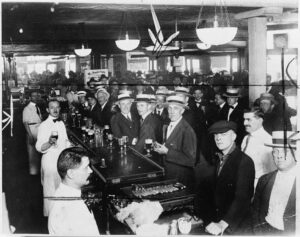 From 1920 to 1929, the consumption of alcohol was outlawed in the United States. The Eighteenth Amendment went into effect in 1920, banning the production, importation, and sale of alcoholic beverages in the United States. That amendment immediately produced a whole new group of criminals…those who would not comply with the new law that they felt was unconstitutional. Whether it was or whether it wasn’t, made no difference. They would not comply. Alcohol went “underground” in more ways than one.
From 1920 to 1929, the consumption of alcohol was outlawed in the United States. The Eighteenth Amendment went into effect in 1920, banning the production, importation, and sale of alcoholic beverages in the United States. That amendment immediately produced a whole new group of criminals…those who would not comply with the new law that they felt was unconstitutional. Whether it was or whether it wasn’t, made no difference. They would not comply. Alcohol went “underground” in more ways than one.
From 1920 to 1929, the Eighteenth Amendment was the law of the land concerning alcohol. Then on March 2, 1929, the Jones Act was signed into law by President Calvin Coolidge. It was effectively the last gasp of Prohibition. The Jones Act strengthened the federal penalties for the bootlegging of alcohol. This, the last act, caused the 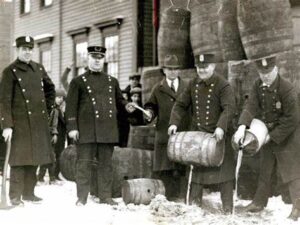 country to reject Prohibition within five years, and to repeal the Eighteenth Amendment. Prohibition was never particularly popular across the nation and when the people slowly realized that it had other ramifications, it rapidly fell by the wayside. The biggest problem with Prohibition was that it didn’t stop the public’s demand for alcohol. Oh, consumption did drop some, but it remained substantial, nevertheless, and in order to fill this now criminal demand, an entire criminal infrastructure was created virtually overnight.
country to reject Prohibition within five years, and to repeal the Eighteenth Amendment. Prohibition was never particularly popular across the nation and when the people slowly realized that it had other ramifications, it rapidly fell by the wayside. The biggest problem with Prohibition was that it didn’t stop the public’s demand for alcohol. Oh, consumption did drop some, but it remained substantial, nevertheless, and in order to fill this now criminal demand, an entire criminal infrastructure was created virtually overnight.
Of course, alcohol was now more expensive, and it brought in enormous amounts of money. Illegal trafficking was highly profitable and helped established organized crime. Crime syndicates dominated the major cities. 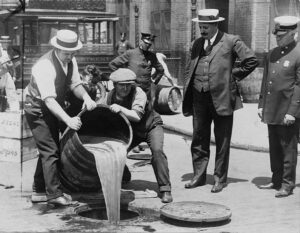 Bribery was running rampant, fueled by those who could afford to bribe officials throughout the criminal justice system. Law enforcement became corrupt, and the federal government became a major player in policing and prosecuting law breakers for the first time.
Bribery was running rampant, fueled by those who could afford to bribe officials throughout the criminal justice system. Law enforcement became corrupt, and the federal government became a major player in policing and prosecuting law breakers for the first time.
Prohibition did nothing to really stop alcohol consumption but rather caused a major breakdown in the social fabric because of its effect on the national psyche. With so many of the people brazenly ignoring the law, an atmosphere of cynicism and hypocrisy was established. Finally repealed the Eighteenth Amendment and Prohibition were widely viewed as a total failure. All that effectively ended with the Jones Act on March 2, 1929.

 Who would have thought that this day would come? Fifty years ago, my husband, Bob Schulenberg…the love of my life…and I said our “I dos” and stepped out into a lifetime of love and great memories. I am actually so surprised to be here…not at our Golden Anniversary, but rather at this point so quickly. It seems like just yesterday that we got married!! How could the years have gone by so fast. Nevertheless, while they went by quickly, the years have been so blessed. I could not have asked for a better life if I tried. Following our marriage, we quickly became the parents of two precious little girls, Corrie Petersen and Amy Royce. They blessed our lives beyond measure. They were always well behaved, sweet little girls who were each other’s best friends. They got along so well, and almost never fought.
Who would have thought that this day would come? Fifty years ago, my husband, Bob Schulenberg…the love of my life…and I said our “I dos” and stepped out into a lifetime of love and great memories. I am actually so surprised to be here…not at our Golden Anniversary, but rather at this point so quickly. It seems like just yesterday that we got married!! How could the years have gone by so fast. Nevertheless, while they went by quickly, the years have been so blessed. I could not have asked for a better life if I tried. Following our marriage, we quickly became the parents of two precious little girls, Corrie Petersen and Amy Royce. They blessed our lives beyond measure. They were always well behaved, sweet little girls who were each other’s best friends. They got along so well, and almost never fought.
Through the years we had many opportunities to travel the country and show our sweet girls what a great nation this is. We especially loved the Black Hills of South Dakota; a place we still go every year. We also took some trips with just the two of us. These were like second, third, fourth, etc honeymoons, and we felt very blessed. Our parents helped out with those trips, of course, by watching our girls while we were gone. Those were usually just weekend trips, but they were a lot of fun.
All too soon, our girls were graduating and then getting married. We became empty nesters, but it wasn’t too long before our house was filled with babies. We were young grandparents…I was 39 and Bob was 40, and we were so excited. Plus, being young gave us more energy to be active grandparents. The girls brought the kids 

 over every morning before school, and they would be with me until it was time for school. Those were always precious times for me. We had one granddaughter and three grandsons…Christopher Petersen, Shai Royce, Caalab Royce, and Joshua Petersen. We were so very blessed. Those were wonderful years, filled with giggling, laughter, love, and fun.
over every morning before school, and they would be with me until it was time for school. Those were always precious times for me. We had one granddaughter and three grandsons…Christopher Petersen, Shai Royce, Caalab Royce, and Joshua Petersen. We were so very blessed. Those were wonderful years, filled with giggling, laughter, love, and fun.
As with our girls, our grandchildren soon grew up and two of them are now married with children. Once again, our world is filled with babies laughing and playing. We don’t babysit as often, but sometimes we do. We have one great granddaughter, and five great grandsons…Cambree, Caysen, Justin, Axel, Cyler, and Cristen Petersen, and we feel so very blessed. We see the kids as often as we can, but when we can’t their parents are so sweet to send us lots of pictures and videos. Technology is a great blessing too.
Bob and I still enjoy traveling, going to the Black Hills and Thermopolis, Wyoming every year. Our travel is rather simple. We love hiking and the sightseeing of these scenic areas. We like to go to visit our daughter Amy Royce and her family in Ferndale, Washington too. That area has so much beauty, and the hiking is amazing. Now, we find ourselves on a new road…part of the Golden Anniversary crowd. How amazing is that? We are both retired, so our time is our own, to do with as we please. These are blessed days in a whole new way. We might jump in the car and take a drive to the lake on the spur of the moment. Or we might decide to just have a 

 quiet evening at home. We don’t have to make serious plans. The thing we are doing the most is to simply enjoy being together, because after all these years we still say “I do” and still love each other very much. Happy Golden Anniversary to the love of my life, Bob Schulenberg. I love you so much and thanks for the memories.
quiet evening at home. We don’t have to make serious plans. The thing we are doing the most is to simply enjoy being together, because after all these years we still say “I do” and still love each other very much. Happy Golden Anniversary to the love of my life, Bob Schulenberg. I love you so much and thanks for the memories.

 My grandson, Chris Petersen, the boy who made me a grandma, and the man who made me a great grandma, continues to make me proud of his accomplishments every day. Chris initially went to culinary school at Sheridan College after graduating from high school, but when he realized that he couldn’t effectively support a family in Casper, Wyoming as a chef, he chose to switch careers and now is a store manager for Auto Zone here in Casper. Mechanics has always been his main hobby, and since changing careers, he is genuinely happy. Just because a person has a degree in something, doesn’t mean that they can’t change their mind when opportunities arise. Chris is an excellent manager, and that is what matters most…plus, with a family, a job of straight nights isn’t always the greatest thing to have. Chris works well with his people, and they respect his knowledge and abilities.
My grandson, Chris Petersen, the boy who made me a grandma, and the man who made me a great grandma, continues to make me proud of his accomplishments every day. Chris initially went to culinary school at Sheridan College after graduating from high school, but when he realized that he couldn’t effectively support a family in Casper, Wyoming as a chef, he chose to switch careers and now is a store manager for Auto Zone here in Casper. Mechanics has always been his main hobby, and since changing careers, he is genuinely happy. Just because a person has a degree in something, doesn’t mean that they can’t change their mind when opportunities arise. Chris is an excellent manager, and that is what matters most…plus, with a family, a job of straight nights isn’t always the greatest thing to have. Chris works well with his people, and they respect his knowledge and abilities.
Chris is a great daddy. His wife, Karen and their kids, Cambree, Caysen, and Cyler are his top priorities, and his 
 greatest accomplishments. He loves spending time with each of them and creating happiness for their whole family. Cambree is his little princess, and he enjoys spoiling his only girl just a little bit…not that she acts spoiled, because she doesn’t. Recently, he has taken up the sport of golf and has really enjoyed taking Caysen to be his golfing buddy. Of course, to ask Caysen, he is usually the one to beat his daddy. Cyler, thinks his daddy hung the moon. He loves playing chase with him, hoping Daddy won’t be able to catch him. For Chris and Karen, their family is the most important part of their lives. They are very devoted to each other and to their kids.
greatest accomplishments. He loves spending time with each of them and creating happiness for their whole family. Cambree is his little princess, and he enjoys spoiling his only girl just a little bit…not that she acts spoiled, because she doesn’t. Recently, he has taken up the sport of golf and has really enjoyed taking Caysen to be his golfing buddy. Of course, to ask Caysen, he is usually the one to beat his daddy. Cyler, thinks his daddy hung the moon. He loves playing chase with him, hoping Daddy won’t be able to catch him. For Chris and Karen, their family is the most important part of their lives. They are very devoted to each other and to their kids.
Chris is becoming quite the handyman. In the past they owned their home, and they will again, but with the market as it is, they will wait. When they moved into their current home, the back yard was really bad, but 
 Chris went to work on it, and before long the yard looked really great. He takes care of the snow removal and mowing. And he has even put in a new dishwasher when it was needed. Of course, Landlords love tenants like Chris, because the place is well taken care of. some tenants just don’t care what the place looks like, but Chris is not one of those tenants. The yard is especially important to Chris, because his kids have to play there, and he wants it to be nice for them. When it comes to the yard, the kids and the dogs are the priority. Today is Chris’ birthday. Happy birthday Chris! Have a great day! We love you!
Chris went to work on it, and before long the yard looked really great. He takes care of the snow removal and mowing. And he has even put in a new dishwasher when it was needed. Of course, Landlords love tenants like Chris, because the place is well taken care of. some tenants just don’t care what the place looks like, but Chris is not one of those tenants. The yard is especially important to Chris, because his kids have to play there, and he wants it to be nice for them. When it comes to the yard, the kids and the dogs are the priority. Today is Chris’ birthday. Happy birthday Chris! Have a great day! We love you!

 My mother-in-law, Joann Schulenberg was a hard-working woman most of her life. It wasn’t necessarily that she did hard physical labor, but she always had busy hands. Having a garden vegetable garden all her life, she spent the harvest seasons canning vegetables to provide food for her family. She also canned meat whenever they raised a cow or purchased a side of beef. When she wasn’t canning, she was baking. Her house always had cake, cinnamon rolls, cookies, or some other such goodies for the snacking pleasure of her family. If you didn’t get your “sugar fix” you had only yourself to blame. Of course, that wasn’t always a good thing, because it was easy to overindulge on those fattening treats. Nevertheless, they were delicious, and always homemade. She was one to begin making dinner right after lunch, or sometimes even before. She was an excellent cook, and if you were a “meat and potatoes” kind of person, you were sure to get your fill.
My mother-in-law, Joann Schulenberg was a hard-working woman most of her life. It wasn’t necessarily that she did hard physical labor, but she always had busy hands. Having a garden vegetable garden all her life, she spent the harvest seasons canning vegetables to provide food for her family. She also canned meat whenever they raised a cow or purchased a side of beef. When she wasn’t canning, she was baking. Her house always had cake, cinnamon rolls, cookies, or some other such goodies for the snacking pleasure of her family. If you didn’t get your “sugar fix” you had only yourself to blame. Of course, that wasn’t always a good thing, because it was easy to overindulge on those fattening treats. Nevertheless, they were delicious, and always homemade. She was one to begin making dinner right after lunch, or sometimes even before. She was an excellent cook, and if you were a “meat and potatoes” kind of person, you were sure to get your fill.
When she wasn’t canning, baking, or cooking, my mother-in-law kept busy sewing, knitting, or crocheting. She made a living sewing clothing for a number of people, including my uncle, Jack McDaniels’ mom, for whom she sewed for a number of years. I only knew about that connection when I announced my engagement to my husband, Bob Schulenberg. My mother-in-law crocheted many afghans, that she sold at craft fairs and then received numerous orders for more. Those craft fairs left her with months of jobs and many referrals. One of 
 my favorite items that my mother-in-law made was the “sweaters” she knitted. I use the word sweater lightly, because the ones she made were of a heavy yarn and equipped with a zipper, making them a coat. We all had one, and trust me, you didn’t need a coat.
my favorite items that my mother-in-law made was the “sweaters” she knitted. I use the word sweater lightly, because the ones she made were of a heavy yarn and equipped with a zipper, making them a coat. We all had one, and trust me, you didn’t need a coat.
Even after my mother-in-law developed Alzheimer’s Disease, she didn’t slow down. Yes, there were some things that went by the wayside. Things like finding store-bought cookies in the house, and less jar canned food, meaning that there were more store-bought canned foods in the house. She just couldn’t do those things so much anymore. We missed those things, but there was no help for it. Nevertheless, her crocheting remained. She had long been able to crochet “in her sleep” and never miss a stitch. That always amazed me, but when she had to be moved to a nursing home, because she required 24-hour care, she still crocheted. Of course, she didn’t use yarn at this stage, but she knew that her hands should be busy, so she would simply “crochet” with her oxygen tubing. The staff had no idea what she was doing, but after all those years, I knew what she was doing. When she would forget to hang on to her walker, because she was “fiddling” with her oxygen tubing, the concerned staff would panic, because they couldn’t get her to hang on. Upon seeing it in action, I simply asked her if I could hold her crocheting while she walked, all she said to me was, “Don’t lose a stitch!!” Once I “held her crocheting,” she would take hold of her walker, and proceed down the hallway…to the utter amazement of 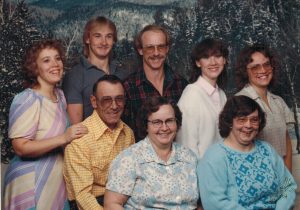
 the staff. Of course, eventually the use of the walker went by the wayside, because she just couldn’t grasp the use of it anymore. That was sad, but she was perfectly content in her recliner wheelchair, because she never liked walking anyway. While her legs were no longer in use, her hands remained busy until the day she passed away. Today would have been my mother-in-law’s 94th birthday. Happy birthday in Heaven, Mom. We love and miss you very much.
the staff. Of course, eventually the use of the walker went by the wayside, because she just couldn’t grasp the use of it anymore. That was sad, but she was perfectly content in her recliner wheelchair, because she never liked walking anyway. While her legs were no longer in use, her hands remained busy until the day she passed away. Today would have been my mother-in-law’s 94th birthday. Happy birthday in Heaven, Mom. We love and miss you very much.
 In 1873, the US Congress decided to follow the lead of many European nations and stop buying silver and minting silver coins. Silver was becoming relatively scarce, and it was thought that this new plan would simplify the monetary system. Several other factors exacerbated the situation, and a financial panic quickly set in. Silver prices began dropping rapidly when the government stopped buying silver, and many owners of primarily western silver mines were immediately hurt. The owners of silver weren’t the only ones effected. Farmers and others who carried substantial debt loads attacked the so-called “Crime of ’73.” Theirs might not have been an exact reason, but they believed that it caused a tighter supply of money, which in turn made it more difficult for them to pay off their debts.
In 1873, the US Congress decided to follow the lead of many European nations and stop buying silver and minting silver coins. Silver was becoming relatively scarce, and it was thought that this new plan would simplify the monetary system. Several other factors exacerbated the situation, and a financial panic quickly set in. Silver prices began dropping rapidly when the government stopped buying silver, and many owners of primarily western silver mines were immediately hurt. The owners of silver weren’t the only ones effected. Farmers and others who carried substantial debt loads attacked the so-called “Crime of ’73.” Theirs might not have been an exact reason, but they believed that it caused a tighter supply of money, which in turn made it more difficult for them to pay off their debts.
Most Americans today wouldn’t really understand the problems surrounding the elimination of the coinage of silver. Nevertheless, in the late 19th century, it was a topic of keen political and economic interest. Our money, these days is basically “secured” by faith in the stability of the government, but prior to that time, money was backed by actual  deposits of silver and gold, the so-called “bimetallic standard.” The US also minted both gold and silver coins. The fact that we went away from the “bimetallic standard” or for that matter, the “gold standard” has been a detriment to this country since that time. When money can be made without any gold or silver backing, it weakens the money.
deposits of silver and gold, the so-called “bimetallic standard.” The US also minted both gold and silver coins. The fact that we went away from the “bimetallic standard” or for that matter, the “gold standard” has been a detriment to this country since that time. When money can be made without any gold or silver backing, it weakens the money.
Enter the Bland-Allison Act, which provided for a return to the minting of silver coins. A nationwide drive to return to the “bimetallic standard” began sweeping the nation, and many Americans began to place their undying faith in the ability of silver to solve their economic difficulties. Missouri Congressman Richard Bland led the fight to remonetize silver. Bland was no stranger to the struggles of the small farmers, but his background was in mining. Bland became a fervent believer in the silver cause. William B Allison was a US representative  from 1863 to 1871 and senator from 1873 to 1908 from Iowa. He was also the cosponsor of the Bland-Allison Act of 1878. Both men were against the “faith in the stability of the government” form of currency.
from 1863 to 1871 and senator from 1873 to 1908 from Iowa. He was also the cosponsor of the Bland-Allison Act of 1878. Both men were against the “faith in the stability of the government” form of currency.
The best part of Bland’s part in this was that he had the backing of powerful western mining interests. He quickly secured passage of the Bland-Allison Act, which became law on February 28, 1878. Although the act did not provide for a return to the old policy of unlimited silver coinage, it did require the US Treasury to resume purchasing silver and minting silver dollars as legal tender. Americans could once again use silver coins as legal tender, and this helped some struggling western mining operations. Other than that, however, the act had little economic impact, and it failed to satisfy the greater desires and dreams of the silver backers. The battle over the use of silver and gold continued to occupy Americans well into the 20th century.
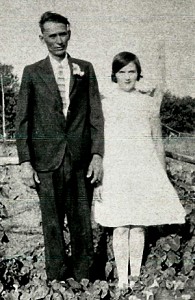
 My grandmother, Harriet Elizabeth “Hattie” (née Pattan) Byer was a tiny woman, just under five feet tall…in her tall days, but if you think that made her a “weakling” you had better think again. This tiny mother of nine children ruled her roost quite well, thank you. Anytime one of her kids, young or older, thought they could get the best of her, they quickly found out that they would be picking themselves up off the floor. One time, her daughter, my Aunt Bonnie McDaniels jokingly told her mom that she couldn’t take her anymore. Aunt Bonnie was a grown woman by then, but her mom quickly reached down and grabbed Aunt Bonnie’s ankles, lifting her feet off the floor. From her new, now seated on the floor position, Aunt Bonnie’s mouth dropped open in shock. Of course, Aunt Bonnie wasn’t actually being disciplined. They both knew they had been joking, but Aunt Bonnie knew that her mom could “take her” down.
My grandmother, Harriet Elizabeth “Hattie” (née Pattan) Byer was a tiny woman, just under five feet tall…in her tall days, but if you think that made her a “weakling” you had better think again. This tiny mother of nine children ruled her roost quite well, thank you. Anytime one of her kids, young or older, thought they could get the best of her, they quickly found out that they would be picking themselves up off the floor. One time, her daughter, my Aunt Bonnie McDaniels jokingly told her mom that she couldn’t take her anymore. Aunt Bonnie was a grown woman by then, but her mom quickly reached down and grabbed Aunt Bonnie’s ankles, lifting her feet off the floor. From her new, now seated on the floor position, Aunt Bonnie’s mouth dropped open in shock. Of course, Aunt Bonnie wasn’t actually being disciplined. They both knew they had been joking, but Aunt Bonnie knew that her mom could “take her” down.
In those days of raising children, women didn’t just go down to the store to buy bread and such. One of the first things done in the mornings was to get the bread set so that by afternoon, it was ready to bake. If the bread didn’t get set, there would be no bread with dinner, or for any other meal. Of course, with nine children, sometimes, Grandma’s bread making task was a little bit delayed, while she nursed a hungry little one. Then, there was the laundry to do. With a large family, I would imagine that the laundry was also a daily task. There had to be mountains of laundry to do each day, and then, mountains of clean clothes to hang on the line to dry. Then, there were the meals to prepare. Soup was often the meal of the day, and the best soup simmers for a long time. After the meals, there were mountains of dishes to wash, a task which found all the kids singing while they worked. While there was a lot of work to be done in a household with so many people, the result was a lifetime of sweet memories for those who lived there. And memories is whhat it’s all about, right.

 Grandma was the seventh child in a family of ten children, born to George and Estella (née Shaw) Pattan on February 26, 1909. She also had an older half-sister, making the family total eleven children. She was named after her grandmother, Elizabeth (née Schuck) Pattan, which was an honor to be sure. Tradition is big in most families, and Grandma Byer’s family was no exception. Today is the 116th anniversary of Grandma Byer’s birth. Happy birthday in Heaven, Grandma Byer. We love and miss you very much.
Grandma was the seventh child in a family of ten children, born to George and Estella (née Shaw) Pattan on February 26, 1909. She also had an older half-sister, making the family total eleven children. She was named after her grandmother, Elizabeth (née Schuck) Pattan, which was an honor to be sure. Tradition is big in most families, and Grandma Byer’s family was no exception. Today is the 116th anniversary of Grandma Byer’s birth. Happy birthday in Heaven, Grandma Byer. We love and miss you very much.

 It seems to be a tradition to give nicknames to just about anyone, but especially to characters that have a unique or excentric way about them. Often, like the case of John Eli Perrett the nickname simply comes from the location where they live or where some event in their life happens. Known as Potato Creek Johnny, John was an American frontiersman and gold miner, best known for having discovered one of the largest gold nuggets ever discovered in the Black Hills in 1929. Born on February 9, 1866 or 1868. His father was Thomas Perrett, but as of this day, his mother’s name remains a mystery. Perrett was born in Abergavenny, Wales. In 1883, the family immigrated to the United States, planning to participate in the gold rush in the Black Hills. They were very focused in their plan. They arrived in New York City, took a train to Sidney, Nebraska, and then took a stagecoach to Central City, South Dakota.
It seems to be a tradition to give nicknames to just about anyone, but especially to characters that have a unique or excentric way about them. Often, like the case of John Eli Perrett the nickname simply comes from the location where they live or where some event in their life happens. Known as Potato Creek Johnny, John was an American frontiersman and gold miner, best known for having discovered one of the largest gold nuggets ever discovered in the Black Hills in 1929. Born on February 9, 1866 or 1868. His father was Thomas Perrett, but as of this day, his mother’s name remains a mystery. Perrett was born in Abergavenny, Wales. In 1883, the family immigrated to the United States, planning to participate in the gold rush in the Black Hills. They were very focused in their plan. They arrived in New York City, took a train to Sidney, Nebraska, and then took a stagecoach to Central City, South Dakota.
Like most people who headed West in search of the gold, the hunt didn’t start immediately for Perrett, who initially worked various jobs in the area, including as a wrangler at Dorsett Ranch. Then he started panning for gold with other prospectors in streams and rivers. Finally, he chose to file a claim on Potato Creek, a tributary of Spearfish Creek. It was here that he got his nickname. Potato Creek Johnny later began working in the pumphouse of the local tin mine but became unemployed after the mine closed in January 1929. After that, he resumed prospecting in Potato Creek.
Potato Creek Johnny wasn’t a big man, standing only 4’3″ tall, but on May 27, 1929, he managed to “hit big” when he found the largest gold nugget ever discovered in the Black Hills. The nugget, measuring 228.5 grams, which was in the shape of a leg. It was big news, and very valuable. In 1934, local businessman W E Adams bought the nugget from Johnny for $250, which would be valued at $5,888 in 2025. Adams put the nugget on display in the Adams Museum, but due to theft concerns, the original nugget was removed and placed in a safe deposit box. It was replaced with a replica, so people could at least see how big it was. In 2014, a secure case was installed in the museum so the original could be placed on permanent display.
Of course, as with any unique find, there were skeptics, so the authenticity of Potato Creek Johnny’s gold nugget has been the subject of debate. Some of the local residents suspected that Johnny had created the nugget by melting down smaller quantities of gold into one piece, and some even accused him of having stolen the gold to do so. Nevertheless, analysis of the nugget by various gold experts have determined the nugget is likely to be authentic, due to the presence of natural quartz crystals inside.
As for Johnny, he became a local folk hero. He grew out his hair and beard and dressed in old clothing, capitalizing on the stereotypical appearance of a 19th-century placer miner. He participated in tourism efforts, being made an “ambassador by the Deadwood Chamber of Commerce and became a feature of Deadwood’s Days of ’76 celebrations” in subsequent years. In 1939, Life magazine picked up on him and did a feature 
 article on him. On March 13, 1907, Johnny married Molly Hamilton of Belle Fourche, South Dakota. Unfortunately, they had no children and divorced in September 1928. Potato Creek Johnny died on February 26, 1943, at the age of about 77, after a two-week illness. His funeral procession on March 3 passed by the Adams Museum, and a bell tolled 77 years, once for each year of his life. He is buried next to Wild Bill Hickok and Calamity Jane in Mount Moriah Cemetery in Deadwood.
article on him. On March 13, 1907, Johnny married Molly Hamilton of Belle Fourche, South Dakota. Unfortunately, they had no children and divorced in September 1928. Potato Creek Johnny died on February 26, 1943, at the age of about 77, after a two-week illness. His funeral procession on March 3 passed by the Adams Museum, and a bell tolled 77 years, once for each year of his life. He is buried next to Wild Bill Hickok and Calamity Jane in Mount Moriah Cemetery in Deadwood.

 My niece, Christina Hockenbrocht has had a busy year. Christina got engaged and married her husband, Colin Hockenbrocht on February 11, 2024. On that day, Christina became a wife and also a stepmom to Colin’s son Matt Hockenbrocht. The kids didn’t have a formal wedding, but in the not-too-distant future, they are planning to have a reception. For anyone who has never hosted one, the reception can be as much or more expensive than the wedding itself. It takes planning and finances. Since that time, Christina has been settling into married and family life.
My niece, Christina Hockenbrocht has had a busy year. Christina got engaged and married her husband, Colin Hockenbrocht on February 11, 2024. On that day, Christina became a wife and also a stepmom to Colin’s son Matt Hockenbrocht. The kids didn’t have a formal wedding, but in the not-too-distant future, they are planning to have a reception. For anyone who has never hosted one, the reception can be as much or more expensive than the wedding itself. It takes planning and finances. Since that time, Christina has been settling into married and family life.
Christina and Colin have moved into a “cute” rental house, and Christina is setting it up to their liking. She is really getting into the “nesting” thing. She has also been getting into gardening and house plants. Her favorite plant is Clawdeen the Monstera. I don’t know much about plants, having a “brown thumb” and all, so I looked it up. “Monstera deliciosa, also known as the split-leaf philodendron or Swiss cheese plant, is a tropical plant often kept as a houseplant. This easy-to-grow climbing evergreen provides a dramatic focal point due to its size and unique shape. Monstera deliciosa has glossy, heart-shaped split leaves and is relatively easy to care for. It is a fast grower, about 1 to 2 feet a year, and takes about three years to reach full-grown maturity.” One thing I do know is that Christina’s Clawdeen the Monstera looks very healthy, meaning that she does not have a “brown thumb” like her Aunt Caryn.
Chistina was educated as a dental hygienist, but when Covid hit, the job she had pretty much dried up. People couldn’t even go to the dentist in those days, unless it was an emergency. Christina went from hygienist to 
 medical and dental billing, and then to insurance billing. In fact, that is what she is doing now. The only thing that is different now is that she is working from home. She is doing insurance billing for multiple companies, working under the umbrella company called Cher, LLC.
medical and dental billing, and then to insurance billing. In fact, that is what she is doing now. The only thing that is different now is that she is working from home. She is doing insurance billing for multiple companies, working under the umbrella company called Cher, LLC.
Colin was a military operations analyst in the military. He and Christina met through her stepdad, and the rest is history. Before long, they were engaged and soon after they were married. He is no longer in the service, and he works as operations analyst as a separate contractor. His son Matt has the choice of where he lives, and for now spends much of his time with his mom. He comes to stay with Christina and Colin for holidays and summers. Sounds like they have a real nice life. Today is Christina’s birthday. Happy birthday Christina!! Have a great day!! We love you!!

